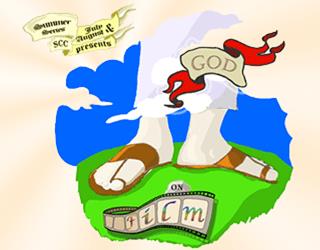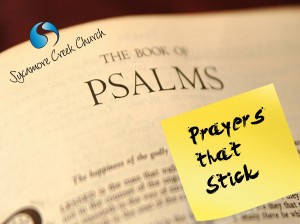
Terminator: Genisys – Endings & Beginnings
Sycamore Creek Church
July 12/13, 2015
Tom Arthur
I’ll be back!
Have you ever tried to stop doing something? It’s hard. Maybe you’re trying to stop eating sugar or greasy foods. Or stop staying yes to everything. Or stop watching too much TV. Or stop smoking. Or stop telling white lies. Or stop looking at porn. Or stop criticizing your spouse. Or stop raising your voice at your kids. Or stop worrying. Or stop spending money impulsively. Or stop speeding. Or stop texting while driving. Or stop posing. The habit just keeps saying “I’ll be back.” What in your life do you need to terminate?
Homer Simpson says, “Trying is the first step toward failure.” Trying to stop something is hard. That’s why the first step toward termination is dying. Paul, the first missionary of the church and the author of many of the books of the Bible said:
Or have you forgotten that when we were joined with Christ Jesus in baptism, we joined him in his death? For we died and were buried with Christ by baptism.
~Romans 6:3-4 NLT
Today as we celebrate the baptism of many in our church we continue in this series, God on Film, with the movie Terminator: Genisys. Each week we’re looking at a theme the summer’s blockbusters evoke. This week I’m struck by the irony in the title. Terminator implies ending. Genisys implies beginning. So as we move toward baptism today I want to explore two things that we terminate in baptism and two things that begin in baptism. You can call them our “to stop doing list” and our “to do list.”
2 Things that Need to be Terminated: Shifting Allegiances
If you’re not that familiar with the Terminator movies, let me give you a quick recap. Skynet is an Evil Artificial Intelligence that launches an attack to exterminate humanity on a day called “Judgement Day.” John Connor is the Tech-Com human resistance leader. Sarah Connor is John Connor’s mom. Kyle Reese is a Tech-Com lieutenant sent back to save Sarah from Skynet’s plan to kill her through time travel. The Terminator is played by Arnold Schwarznegger, but there are more than one terminator. There’s the T-1000, T-X, T-800 are other future Terminator Models.
Some version of the terminator is always trying to, well, terminate Sarah or John Connor or some other key person to the future human resistance. In the first Terminator movie (1984), Arnold Schwarzenegger is a bad guy. He’s out to kill Sarah. But in Terminator 2, Judgment Day (1991), Schwarzenegger changes allegiances and is a good guy. He’s out to save Sarah. In Terminator 3, Rise of the Machines (2003), Schwarzenegger’s Terminator alternates allegiances between good guy, bad guy, good guy. Then Schwarzenegger takes a break from 2003 to 2011 to be the Governator and Terminator 4, Salvation (2009) comes out and Schwarzenegger is rendered in CGI. Then this summer we get Terminator 5, Genisys (2015), and Schwarzenegger is once again the good guy protecting Sarah Connor and Kyle Reese from, the last person you expected to be the bad guy, John Connor, Sarah’s son! Talk about shifting allegiances. Back and forth. Flip flop. Good guy. Bad guy.
Paul knows that we’re tempted to shift our allegiances back and forth and so he tells us:
Well then, should we keep on sinning so that God can show us more and more of his wonderful grace? Of course not! Since we have died to sin, how can we continue to live in it?
~Romans 6:1-2 NLT
Sin is a force inside us that causes us to miss the mark, intentionally and unintentionally, and we keep flip flopping our allegiance back and forth with it. This causes our external allegiances to be constantly shifting. What’s really worth our allegiance? What determines our allegiances? Sometimes we form allegiances based on where we were born: Neighborhood, City, State, Region, or Country (“I pledge allegiance to the flag…”). Or we base our allegiances on our education: High School, College (Spartans vs. Wolverines), or Grad School (Blue Devils). Or we base our allegiances upon politics: Republican, Democrat, Green Party, Natural Law, or Independent. In our culture our allegiances are often to price: Sales, Deals, and Coupons or advertising and marketing: brand and celebrity. Or novelty: the latest tech, ideas, or fads. Or maybe we base our allegiances on our family: spouse, parents, grandparents, or kids. All the while God is asking for our full allegiance. Yet our allegiances are cyclical. Self – God – Self – God
We keep telling God: “I’ll be back.”
Today, those being baptized are making a choice to TERMINATE shifting allegiances. That’s the first thing to stop doing.
2 Things that Need to be Terminated: Sin’s Control
The second thing that is on our “to stop doing” list is sin’s control over our lives. Paul says:
Do not let sin control the way you live; do not give in to sinful desires.
~Romans 6:12 NLT
Remember, sin is a force inside us that causes us to miss the mark, intentionally and unintentionally. It has control over us. We give it control. We succumb to its control. Yet Paul tells us to not let sin control the way we live. Yet we often feel helpless against the power of sin within us.
Today those being baptized are being given a new power to TERMINATE sin’s power and hold over us. The new power is the Holy Spirit! The Holy Spirit is God’s presence and power at work in us. It’s not that God isn’t at work in you before you are baptized, but that in baptism you’re fully submitting to participate and cooperate with God’s Presence, the Holy Spirit’s work in you. This is why we anoint with oil after baptism. Oil is a symbol of the Holy Spirit.
So does this mean that we never sin again after we’re baptized? No. But as John Wesley, the founder of the Methodist church says, “Sin remains but it does not reign.” Tide of the war is won, but battles remain. Daily we have to “repent” or turnaround from the ways we’re heading away from God and turn toward God. And yet, something significant changes. I’m reminded of my son learning to ride a bike. In the last month he’s gone to a peddle two-wheel bike with no training wheels. He knows how to balance. He’ll never forget how to balance on a bike. You can’t unlearn how to ride a bike. (Yeah. Yeah. Yeah. The skeptics are thinking about how you can lose your inner ear balance ability. Stop stretching my analogies to the breaking point!) But just because Micah can’t unlearn how to ride a bike doesn’t mean he won’t fall and scrape himself up. Sin remains but it does not reign.
Today those being baptized are TERMINATE-ing two things:
- Shifting Allegiances
- Sin’s Control
Say it with me: “Hasta la vista baby.”
2 Beginnings in Baptism: Give yourselves completely to God
So we’ve talked about what gets terminated in baptism but what about two things that begin in baptism? The first is this: you give yourself completely to God. No more shifting allegiances. Complete and total devotion to God. Paul says:
Instead, give yourselves completely to God, for you were dead, but now you have new life.
~Romans 6:13 NLT
“Completely.” Other translations say “yield.” One thing I love to do on water is sail. There are a whole set of rules governing who yields to who on the water. Motor boats yield to sail boats because they’re more maneuverable. Smaller boats yield to bigger boats. And everybody yields to freighters! A freighter sometimes takes several miles to stop or turn. You can’t half-yield with a freighter. You can’t partially yield with a boat that takes a mile to stop. You yield completely or you sink. You yield ALL THE TIME: Yesterday, Today, Tomorrow! In baptism we give ourselves completely to God.
At Sycamore Creek Church our mission is to ignite authentic life in Christ and fan it into an all-consuming flame. When we say “authentic” we mean completely or all the time. We’re not one way today and another way tomorrow. When we say “all-consuming” we mean not just one part of the pie belongs to God, but God is the filling throughout all the pie.
We live this mission with three values: Curious, Creative, and Compassionate. When we say “Curious” we mean that your questions are welcome. You don’t have to have it all figured out to join in. You will never have all your questions answered to give yourself completely to God. Curiosity is welcome. When we say “Creative” we mean that we experiment with new ways to reach new people. And when we say “Compassionate” we mean that no matter who you are, where you’ve been, what you’ve done, or where we meet you we’ll do our best to show you God’s compassion, completely.
Those being baptized today are BEGINNING a life of giving themselves completely to God.
2 Beginnings in Baptism: Live a New Life
The second beginning in baptism is BEGINNING to live a new life. Paul says:
For we died and were buried with Christ by baptism. And just as Christ was raised from the dead by the glorious power of the Father, now we also may live new lives.
~Romans 6:4 NLT
We live new lives by choosing a new master. Do you know that we all serve something? Paul reminds us of this:
Don’t you realize that you become the slave of whatever you choose to obey?
~Romans 6:16 NLT
Bernard Shaw says that “Hell is where you must do what you want to do.” Or as another writer has said, we are all struggling with the “tyranny of our own desires” (Willimon & Hauerwas, Resident Aliens). We are slave to our desires, to our stomachs, to our sex drives, to our emotions, to our fashion, to our philosophy, or to our group. Yet in Christ, Paul reminds us that something new begins:
Now you are free from your slavery to sin, and you have become slaves to righteous living.
~Romans 6:18 NLT
“Slave to righteous living”? What does that mean? I think it means that we’re now serving a new master and that service leads to the life well-lived. You become fully who God has called and created you to be. Irenaeus, a second century church leader, says, “The glory of God is a human fully alive.” Who is the most fully alive human? Jesus was the most fully alive human. He lived with complete allegiance and devotion to God. Sin had no hold over him. His perfect life gave the most glory to God!
But who is Jesus? Christians believe that Jesus was not just a great guy. He was not just a “fully realized” human being. Jesus wasn’t just a prophetic voice. Those being baptized today will confess an ancient creed, a set of statements about what they believe and who they trust. The Apostles’ Creed has three parts:
- I believe and trust in God
- I believe and trust in Jesus Christ, God’s only son.
- I believe and trust in the Holy Spirit.
Jesus was fully God and fully human. Humans were the ones who were stuck in the power of sin and God was the only one who could break the power of sin. So God became a human in Jesus. Jesus’ life, death, and resurrection heals, forgives, and sets us free. Jesus is able to heal, forgive and set us free because of who he is: the Son of God. When we are baptized we join in Jesus’ life, death, and resurrection.
To understand how baptism works and what baptism is, let’s think about water for a moment. What is water? Water is death. People die in water. Today those being baptized die to multiple allegiances. Water is birth. We think about the waters of the womb. Baptism is rebirth and new life. Water is cleansing. We wash our bodies in water. Baptism is a washing and cleansing and forgiveness. Water is a renewal of life. We can go three weeks without food but only three days without water. Baptism is renewal of life. Water is protection. We build motes around castles to protect us from danger. You can only go three hours in a harsh environment without shelter. Baptism is the protection of the Holy Spirit. Water is fun. We play in and with water. Baptism is joining God’s fun adventure. Water is community. We always build cities by or near water. Baptism is the door to the church, the family and mission of God.
When we are baptized we terminate our changing allegiances and sin’s control over us dies. When we are baptized we begin giving ourselves completely to God and living a new life.
I want to invite those being baptized or reaffirming their baptism to come forward and join me in making these commitments:
To the parents and candidates
Tom: Do you seek to avoid evil and do good?
Parents/Candidates: I do.
Tom: Do you confess Jesus as Savior and Lord in community with the church?
Parents/Candidates: I do.
Tom: Will you stay in love with God?
Parents/Candidates: By God’s grace, I will
Tom: Do you believe in God?
Parents/Candidates:
I believe in God, the Father almighty, Creator of heaven and earth.
Tom: Do you believe in Jesus Christ?
I believe in Jesus Christ, His only Son, our Lord.
He was conceived by the power of the Holy Spirit and born of the Virgin Mary.
He suffered under Pontius Pilate, was crucified, died, and was buried.
He descended to the dead.
On the third day He rose again.
He ascended into heaven, and is seated at the right hand of the Father.
He will come again to judge the living and the dead.
Tom: Do you believe in the Holy Spirit?
I believe in the Holy Spirit,
the holy Catholic Church,
the communion of saints,
the forgiveness of sins,
the resurrection of the body,
and life everlasting. Amen.
To parents
Tom: Will you along with the church nurture these children by teaching and example guiding them to accept God’s grace for themselves when they are able?
Parents: I will.
To the church
Tom: Do you as the body of Christ, the church, reaffirm your own desire to avoid evil, do good, and stay in love with God?
Church: We do.
Tom: Do you commit to connecting with God and one another, growing in the character of Christ, and serving the church, community and world?
Church: We do.
Tom: Will you nurture one another and these new partners and members of the family of God in the Christian faith and life, and surround them with a community of love and forgiveness?
Church: We will.
Confirmation (for those reaffirming their faith) & Anointing with Oil
When they come up out of the water…
Tom: NAME, the Lord defend you with his heavenly grace and by his Spirit confirm you in the faith and fellowship of all true disciples of Jesus Christ.
or
The Lord bless you, and keep you;
The Lord make his face to shine upon you, and be gracious to you.
The Lord lift up His countenance upon you,
and give you peace. Numbers 6: 24-26
Congregational Remembrance
Tom: Friends, remember your baptism and be thankful.








Recent Comments